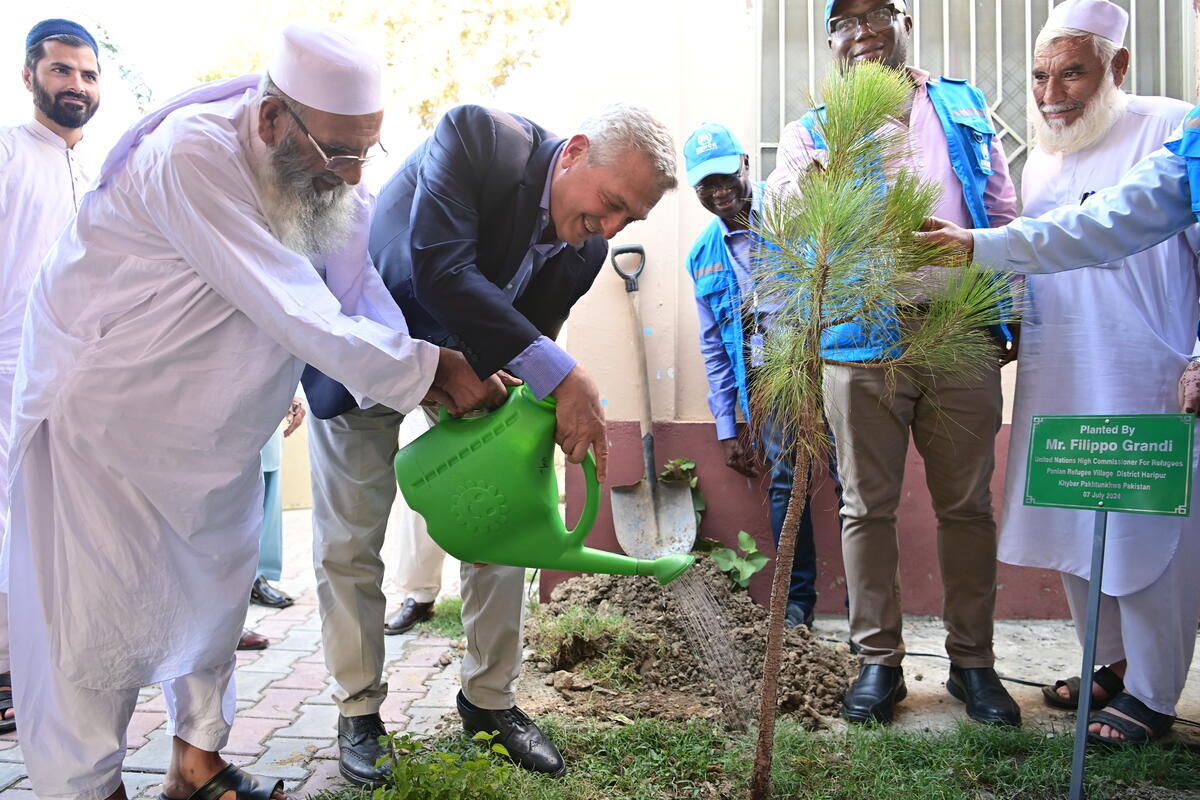Afghan returnees seek livelihood in life-giving projects
Afghan returnees seek livelihood in life-giving projects

BAGRAMI, Afghanistan, July 9 (UNHCR) - Whoever coined the proverb "Give a man a fish and you feed him for a day. Teach him to fish, and you feed him for life" should revisit the concept in eastern Afghanistan, where the UN refugee agency has started a project to spawn fish in a returnee community.
Bagrami in Nangarhar province, near the Afghan border with Pakistan, is a densely populated village of 300 families, two-thirds of them former refugees who have repatriated from Pakistan. Located near the Kabul river, the area has long produced fish for local consumption. In 2005 and 2006, UNHCR helped to start some fish farms in the area to support the community's livelihood, but faced a shortage of freshly-hatched fish, known as fish fry.
"We've always imported fish fry from Pakistan, but it's expensive and the quality is not very good," said Sayed Ghufran, Director of the National Consultancy and Relief Association (NCRA), UNHCR's implementing partner on the project. "It's also hard to transport them all the way from Pakistan as they are often lost or damaged along the way."
To solve the problem and create jobs, UNHCR started a project late last year to produce fish fry in Bagrami. The agency built a two-storey building with seed-laying and nursery ponds, and is training 300 vulnerable men and women - among them returnees - to spawn fish. A female fish is placed in the same indoor pond as two male fish and all three are injected to stimulate reproduction in running water akin to a natural environment. And once the eggs are fertilised, they are moved to a separate tank for hatching. Within a week, the fry is moved to a nursery pond, where they spend several more weeks growing to the right size for sale to fish farms. The whole process takes one to two months.
"This is the first of its kind in Afghanistan," Ghufran said proudly. "The technology is very high-tech. When people heard about it, they started digging their own ponds, waiting for the fry."
Ten new fish farms have already been set up in the area, according to Mohammed Akram, who works at a fish farm nearby. He now has 6,000 fish in his ponds and plans to sell half his stock at 100 afghanis (US$2) per kilogramme. "The community decides how to distribute the income, and we'll invest back into the farm," he said. "I don't think we can all earn a living from this but at least it helps us in some way."
Recognising the limited scope of the fish project, UNHCR has found other fish to fry in order to help returnees settle back in their homeland.
Elsewhere in Nangarhar, 20 vulnerable returnee families in Sheikh Mesri, a government-provided township for returnees, are taking part in a project to raise cows and produce animal feed. Each family was given a pregnant cow late last year, and taught to take care of it through and after its delivery. More than a year later, they are expected to give a calf to another family, thereby starting an ever-expanding cow bank.
Most of the targeted families are headed by widows or women with disabled husbands - people with no voice and few support mechanisms. As the women are approached to discuss the cow project, many run into the house. One crouches at the wall, covering herself from the scrutiny of male strangers.
Manu Gul is one of the few men benefiting from the cow raising project. Sipping contentedly on some home-made lassi [yoghurt drink], the old man said, "The cow produces about 10 kg of milk per day. Sometimes we sell it, sometimes we make yoghurt and give it to the neighbours. The children have grown stronger [from the milk]."
His family of 10 lives with two other families in the same compound. "All the children are busy with the cow," said Manu Gul. "They take it out, they feed it. It's not just a livelihood, it's also entertainment!"
To support the project, UNHCR has built a special facility to produce animal feed at Sheikh Mesri, a semi-arid area with limited grazing land. Five returnees have been trained to grind and mix the feed, which was provided free of charge to cow owners for the first month, and sold at a subsidised price afterwards.
However, Manu Gul is quick to acknowledge that the project is no cash cow. To supplement their income, three of his sons work as drivers and odd job workers in the city of Jalalabad about 18 km away.
A common complaint at Sheikh Mesri is its remote location and lack of access to jobs. Able-bodied men commute to Jalalabad city for daily wage labour, but often spend more than half of their wages on transport alone.

In late June, after extensive discussions between the Department for Refugees and Repatriation and UNHCR, the national bus company started a daily shuttle between the township and Jalalabad. Instead of the regular taxi fare of 50 afghanis one way, Sheikh Mesri's residents are paying a subsidised fare of 15-20 afghanis one way for the mini-bus service. More buses could be added to the route if there is a demand for them.
Nangarhar is one of the largest provinces of return in Afghanistan, accounting for 680,000 out of the 4 million Afghans who have been assisted home by UNHCR from the region since 2002. Most of them have come back from Pakistan, but more than 450,000 Afghans from Nangarhar still remain in Pakistan today, many of them citing security and lack of access to shelter, land and jobs as reasons for not repatriating.
By Vivian Tan and Mohammed Nader Farhad in Jalalabad, Afghanistan








